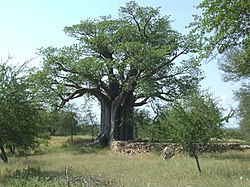Thulamela
This article has multiple issues. Please help improve it or discuss these issues on the talk page. (Learn how and when to remove these messages)
|
| Thulamela | |
|---|---|
 A rebuilt enclosure at Thulamela | |
| Type | Cultural |
| Location | Kruger National Park |
| Coordinates | 22°26′00″S 31°11′51″E / 22.43333°S 31.19750°E |
Thulamela is the most dramatic of around 300 archaeological sites identified in Kruger National Park. It is located on heights south of the Levubu River offering a panoramic view. Sidney Miller led excavations from December 1993 to July 1995,[1] and the site has also been partially reconstructed.
The opening of the rebuilt Thulamela was attended by a hundred guests, including then Minister of Environmental Affairs and Tourism Pallo Jordan and then SANParks chairman, the late Dr. Enos John Mabuza. The name Thulamela comes from a portmanteau of thulwi ("mound") and mela ("growing") in references to the tall anthills in the area.[2]
A kingdom was formed at Thulamela in the 13th century, near the confluence of the Limpopo and Levubu rivers, which specialised in fashioning objects out of smelted copper, gold, and iron, such as gold jewellery, hoes, harpoons and blades. It coexisted and interacted with the Mapungubwe, Great Zimbabwe, and Khami states. It had close relations with the Kingdom of Butua, and Butua's collapse in the 17th century into civil war likely led to Thulamela's isolation from regional networks, and its abandonment soon after.[3]
The graves of a 16th-century king and queen were unearthed in the 1990s excavations. Archaeologists named them King Ingwe and Queen Losha, and their castle was estimated to house 1,000 people.[1] Dwellings along the ruined walls on the hillsides beyond could regularly have housed 2,000.
Similar village ruins can be found in the Mateke Hills on the other side of the Limpopo River in Zimbabwe. The Makahane Cliffs can be found in the same area of Kruger National Park, northeast of the Punda Maria Gate near the Levubu, and was also a Vhalembethu settlement.
The families of the Kingdom Thulamela:
- Makahane — also known as Shagala, Nephawe, Mataji (Matandze)
- Pafuri — known as Makushu (Makush)
- Maphaha Xikumbu (Xikumbu) — son of Thonga Tshilimandila in Phalaborwa.
- Shilowa or Selowa — also known as Machete, Mmopa, Mushiana, Vudogwe, Mbwashishi, Senyolo or Vhadau Vha Damani
Visitors to the park can book tours from Punda Maria Camp up to Thulamela.
See also
[edit]Sources
[edit]- Miller, Sidney Mears (2018). Thulamela: The Lost Gold of the Vha Venda.
References
[edit]- ^ a b Steyn, Maryna; Miller, Sidney; Nienaber, Willem C.; Loots, Marius (1998). "Late iron age gold burials from Thulamela (Pafuri region, Kruger National Park)". The South African Archaeological Bulletin. 58 (168): 73–85. doi:10.2307/3889182. JSTOR 3889182.
- ^ "Thulamela". Luonde, VhaVenda history.
- ^ Delius, Peter; Chewins, Linell; Forssman, Tim (2024). "Turning South African History Upside Down: Ivory and Gold Production, the Indian Ocean Trading System and the Shaping of Southern African Society, 600–1900 AD". Journal of Southern Africa Studies. doi:10.1080/03057070.2024.2436329#d1e350. ISSN 0305-7070.
External links
[edit]- Site by Thulamela , at SAHRA

